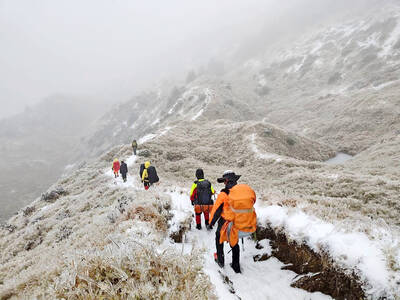For years Taiwan’s professional baseball league has been talking about the possible expansion of its franchise, because with only four teams since 2008, the 28-year league is not as popular as it once was.
The Chinese Professional Baseball League (CPBL) had seven teams back in 1997, but following a series of match-fixing scandals in the mid-1990s, a number of teams disbanded.
Those scandals not only marred the image of the league, they also led to plummeting attendances.

Photo: CNA
In the 1990s, CPBL games averaged crowds of more than 5,000, but attendances more than halved in the wake of the first match-fixing accusations to below 2,000 and stayed below 4,000 for nearly a decade.
With CPBL teams adopting more stringent measures to combat match-fixing and introducing incentives to attract more fans, the league’s average attendance passed 3,000 for the first time in more than a decade in 2013.
The arrival of former Los Angeles Dodgers player Manny Ramirez and the performance of the national team in the 2013 World Baseball Classic helped boost the average attendance to 6,079.
Attendances have remained above 5,000 for the past five years and in 2015 the Taoyuan-based Lamigo Monkeys became the first team to make a profit since the disbanding of the Brother Elephants, a positive outcome welcomed by the other teams.
It is against this backdrop that the league is considering expanding, with more prospective buyers interested in joining the CPBL, recognizing the potential money-making opportunity in a nation that considers baseball its No. 1 sport.
Over the past few years, several local enterprises have expressed an interest, but none have yet taken the plunge.
Over the past few weeks, two teams have finally made their interest in joining the CPBL official and they are not Taiwanese — one is in Okinawa, Japan, and the other in Australia.
During a meeting with CPBL commissioner John Wu (吳志揚) in Taipei on Nov. 3, Australian Baseball League (ABL) chief executive Cam Vale expressed the league’s interest in having a CPBL team, inquiring about the membership rules.
It seems Vale’s questions were more than customary politeness, as a week later the CPBL and the Sports Administration confirmed they had received an official inquiry from Australia indicating they had a team interested in joining the CPBL.
Two weeks later on Sunday, during a meeting with Taiwan’s Representative to Japan Frank Hsieh (謝長廷) in Tokyo, Wu disclosed that Okinawa had also expressed interest in forming a professional baseball team to compete in the CPBL.
It is certainly good news for both the CPBL and local baseball fans that foreign teams are considering joining the league.
Such a move would expand the international visibility of the league, while at the same time making games more competitive for fans who are tired of seeing the same four teams competing against each other year in, year out.
The ABL season runs from November through February, summer in the southern hemisphere.
Minor league prospects in North America are often sent to compete in the ABL as an English-speaking alternative to the Latin America-based Spanish-speaking winter leagues.
Many Taiwanese professional players have also joined ABL teams as part of their winter training.
Meanwhile, Okinawa, Japan’s southernmost prefecture, is only about an hour’s flight from Taiwan.
It has six amateur baseball teams, while Japanese and South Korean professional teams often travel to the island for spring training.
It is not the first time the CPBL has explored overseas opportunities.
In 2011, then-CPBL commissioner Chao Shou-po (趙守博) proposed holding some regular-season games in China, but the proposal was rejected due to political considerations.
While the idea of an ABL or Japanese team joining the CPBL might seem interesting, several major hurdles would have to be overcome before it could become a reality.
First and foremost, is there enough money?
According to CPBL regulations, the entry fee for a new team is NT$120 million (US$4 million), but this comes with a NT$360 million security deposit and an additional NT$100 million for the promotion of the nation’s little leagues.
In other words, any new team has to pay NT$580 million before it can even begin recruiting players and coaching staff.
In addition, the capital of a company owning a CPBL team cannot be more than 50 percent foreign owned.
However, such rules were drafted to apply to local businesses and the CPBL may be thinking of overhauling its rulebook after the interest from foreign teams.
Commenting on the possible inclusion of two foreign teams, Wu said earlier this week that a CPBL board of directors and standing committee meeting next month would discuss whether to accept the Japanese and ABL proposals.
In a telephone interview with the Central News Agency on Thursday, CPBL secretary-general Feng Sheng-xian (馮勝賢) said the league would come up with new rules and qualification standards for foreign teams that want to join the league only after the directors approve the proposals at next month’s meeting.
“We need to draft new rules not just to meet the demands of the proposed Japanese and Australian teams, but also as part of a long-term plan that would work for any foreign team that wants to join the CPBL. That might take some time,” Feng said.
Chen Chih-chung (陳執中), a baseball fan for 25 years, said he would be happy to see a foreign team join the league, but would prefer an ABL team rather than one from Okinawa.
“Okinawa does not have a professional baseball team, which means their team would not be at the same level as the Taiwanese sides,” Chen said.
Echoing Chen’s view, Lin Chieh-hung (林介宏), another long-term fan, said that having a team from Okinawa would not benefit the CPBL because the team would not have the requisite skills or funding to compete.
He also suggested that before accepting an ABL team into the CPBL, the two leagues should hold more exhibition series to see if fans respond positively to the idea.
It might take several months or even years before discussions about a Japanese or Austrlaian team joining the local league bear fruit, but baseball fans are already talking about the possibility, generating the sort of interest that would be welcomed by any professional sports league anywhere in the world.

Trips for more than 100,000 international and domestic air travelers could be disrupted as China launches a military exercise around Taiwan today, Taiwan’s Civil Aviation Administration (CAA) said yesterday. The exercise could affect nearly 900 flights scheduled to enter the Taipei Flight Information Region (FIR) during the exercise window, it added. A notice issued by the Chinese Civil Aviation Administration showed there would be seven temporary zones around the Taiwan Strait which would be used for live-fire exercises, lasting from 8am to 6pm today. All aircraft are prohibited from entering during exercise, it says. Taipei FIR has 14 international air routes and

The Ministry of National Defense (MND) today released images of the military tracking China’s People's Liberation Army (PLA) movements during the latest round of Chinese drills around Taiwan. The PLA began "Justice Mission 2025" drills today, carrying out live-fire drills, simulated strikes on land and maritime targets, and exercises to blockade the nation's main ports. The exercises are to continue tomorrow, with the PLA announcing sea and air space restrictions for five zones around Taiwan for 10 hours starting from 8:30am. The ministry today released images showing a Chinese J-16 fighter jet tracked by a F-16V Block 20 jet and the

Snow fell on Yushan (Jade Mountain, 玉山) yesterday morning as a continental cold air mass sent temperatures below freezing on Taiwan’s tallest peak, the Central Weather Administration (CWA) said. Snowflakes were seen on Yushan’s north peak from 6:28am to 6:38am, but they did not fully cover the ground and no accumulation was recorded, the CWA said. As of 7:42am, the lowest temperature recorded across Taiwan was minus-5.5°C at Yushan’s Fengkou observatory and minus-4.7°C at the Yushan observatory, CWA data showed. On Hehuanshan (合歡山) in Nantou County, a low of 1.3°C was recorded at 6:39pm, when ice pellets fell at Songsyue Lodge (松雪樓), a

NO SHAME IN RETREAT: Hikers should consider turning back if the weather turns bad or if they do not have sufficient equipment, the Taroko park headquarters said Two people died of hypothermia over the weekend while hiking on Hsuehshan (雪山), prompting park authorities to remind hikers to bring proper equipment and consider their physical condition before setting out in the cold weather. Temperatures dropped over the weekend, bringing snow to high altitudes in Shei-pa National Park. One hiker, surnamed Lin (林), who on Friday was traveling with a group of six along the Hsuehshan west ridge trail, lost consciousness due to hypothermia and died, the Shei-pa National Park Headquarters said. On Saturday, another hiker, surnamed Tien (田), in a group of five on the southeast of the west